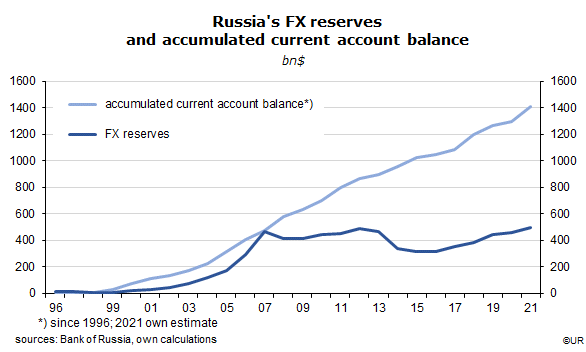Dieter Wermuth, Economist and Partner at Wermuth Asset Management
For a long time, Russia has been selling more to the rest of the world than it has bought. As a result, net foreign assets have increased year after year since at least 1996 (1998 was the only exception) and have now reached $1.4 trillion, the cumulated surpluses of the country’s current account, or 90% of last year’s nominal GDP. Only the smaller part of this wealth consists of official foreign exchange reserves (36%), the rest is held by the private sector, i.e., Russian households and firms (see attached graph). What many seem not to be aware of is, that Russia has been, and is, one of the world’s largest net capital exporters and owner of foreign assets. Identifying and freezing these would be an extremely effective way to hit the entire Russian elite and bring forward the long-overdue regime change and for Russia to join the European club of democracies. Cutting off European gas imports from Russia would be no sanction at all, it would simply be stupid. Better to fill storage tanks as long as the gas flows and speed up investing in alternative energy.
While the Russian government, effectively the central bank, holds its reserves mostly in form of liquid low-interest notes and bonds denominated in dollars, euros, yen, yuan, Swiss francs and sterling, private owners have focused on bonds and investment funds as well as on less liquid investments such as participations in companies, real estate, infrastructure and even football clubs. In the UK, 85,000 offshore shell companies with undisclosed owners hold British assets. Many of these have probably a Russian connection. The British government has repeatedly promised to find out who the so-called beneficiary owners are. It has not come around doing it, keeping in mind the booming and highly profitable money laundering business in the City of London. The Swiss are running a similar racket.
The question is: why is Russia’s private sector continuing to send such a large share of national savings to foreign countries? The obvious answer is that the country suffers from the commodity curse. It is very profitable and easy for the rich to drill holes in the ground and sell the gas, oil, coal, copper, nickel and so on into world markets. No need to develop sophisticated products that require brainpower. The main task for these people is to make sure that they remain in control of these cash cows – which means they must have access to the levers of power, and these are residing in the Kremlin.
This is also a recipe to impoverish a country. Just a few numbers: Germany’s GDP is 2.4 times larger than Russia’s, in spite of its much smaller population, and four times larger on a per-capita basis. In terms of total nominal GDP and at today’s exchange rate, the European Union is no less than 11 ½ times bigger than Russia. Attacking Ukraine and hoping to get away with it is clearly wishful thinking in the light of these statistics. Russia is an economic dwarf that has no chance once the EU gets serious. That is what is happening.

For more information please contact:
Instinctif Partners // Lars Hofer
E lars.hofer@instinctif.com
T +49 162 562 8917
Visit us: https://wermutham.com/
Follow us on Twitter and LinkedIn
About Wermuth Asset Management
Wermuth Asset Management (WAM) is a Family Office which also acts as a BAFIN-regulated investment consultant.
The company specializes in climate impact investments across all asset classes, with a focus on EU “exponential organizations” as defined by Singularity University, i.e., companies which solve a major problem of humanity profitably and can grow exponentially. Through private equity, listed assets, infrastructure and real assets, the company invests through its own funds and third-party funds. WAM adheres to the UN Principles of Responsible Investing (UNPRI) and UN Compact and is a member of the Institutional Investor Group on Climate Change (IIGCC), the Global Impact Investing Network (GIIN) and the Divest-Invest Movement.
Jochen Wermuth founded WAM in 1999. He is a German climate impact investor who served on the steering committee of “Europeans for Divest Invest”. As of June 2017, he is also a member of the investment strategy committee for the EUR 24 billion German Sovereign Wealth Fund (KENFO).
Legal Disclaimer
The information contained in this document is for informational purposes only and does not constitute investment advice. The opinions and valuations contained in this document are subject to change and reflect the viewpoint of Wermuth Asset Management in the current economic environment. No liability is assumed for the accuracy and completeness of the information. Past performance is not a reliable indication of current or future developments. The financial instruments mentioned are for illustrative purposes only and should not be construed as a direct offer or investment recommendation or advice. The securities listed have been selected from the universe of securities covered by the portfolio managers to assist the reader in better understanding the issues presented and do not necessarily form part of any portfolio or constitute recommendations by the portfolio managers. There is no guarantee that forecasts will occur.
Read the full article in PDF format here.
